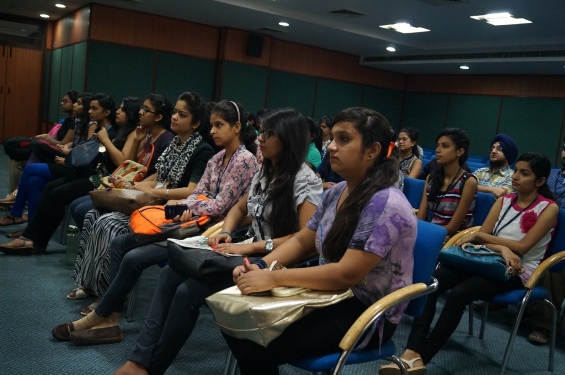29 Sep 2015|Noida | Amity Campus Sector- 125 Noida
Amity Institute of Rehabilitation Sciences (AIRS) organizes Workshop on “Wheelchair Service and Training Delivery

AmityInstitute of Rehabilitation Sciences (AIRS) in collaboration with MobilityIndia (MI), Bangalore organized an Orientation Workshop on “Wheelchair Serviceand Training Delivery as per W.H.O Guidelines for Healthcare Professionals” atAmity Campus, Sector-125, Noida.
TheWorkshop aimed at raising awareness on the need and benefit of structuredWheelchair Training and service delivery to improve the quality of life ofwheelchair users. The Workshop was inaugurated by Ms. Pallavi Chauhan-Jt.Director, Amity Institute of Rehabilitation Sciences, Dr. Jayanti Pujari-Director, Amity Institute of Rehabilitation Sciences, Ms. Vennila Palanivelu-Physiotherapist and Manager for Therapy Training Programme and Mr. RiyazHussain—Physiotherapist and Certified Basic and Intermediate Wheelchair ServiceProvider.
Addressingthe gathering and outlining the importance of the Workshop, Dr. JayantiPujari- Director, Amity Institute of Rehabilitation Sciences stressed thatWheelchair is one of the most commonly used assistive devices for personalmobility but training opportunities for healthcare professionals on wheelchairservice delivery is comparatively very less. She stated that people in Indiaoften depend upon donated wheelchairs, which are usually of poor quality andare not compatible with the requirements of the user. There is also dearth oftrained Rehabilitation professionals who could ensure appropriate Wheelchairsfor the people with disabilities. She expressed hope that the resource personsfrom Mobility India (MI) will inform participants’ about the importance ofappropriate Wheelchairs and how they could help in making the lives of peoplewith disabilities better.
Sharingher views, Resource Person from MI- Ms. Vennila Palanivelu- Physiotherapistand Manager for Therapy Training Programme said that Mobility India (MI) isa resource centre for Wheelchair Service Training Package (WSTP), with 9 yearsof experience in the field of Wheelchair service provision and human resourcedevelopment and has been actively involved in conducting the Orientationprogrammes and structured WSTP Courses within India and overseas.
Dwellingon the importance of Wheelchairs, she stressed that Wheelchairs are not justchairs; customized Wheelchairs bring a difference to the lives of the userssince they help them to move from isolation to inclusion, dependency to freedomand become active contributors rather than just passive receivers. She sharedthat majority of the disabled people cannot afford wheelchairs and in most ofthe cases, simple orthopedic wheelchairs are used which do not have cushionsand are meant to facilitate the temporary movement of people with disabilities.She averred that cushion, just like wheel, is an important feature of awheelchair and not an additional accessory. Referring to a study byMukherjee and Samantha (2005), she highlighted that up to 60% of the usersreject wheel chairs due to unsuitability or discomfort. She remarked thatin India, there is very limited choice when it comes to Wheelchairs and calledupon Rehabilitation Personnel to be provided with proper structured training onWheelchair Service Provision and differently -abled people should be givenappropriate wheelchairs including training for usage.
Sharing his viewson “Appropriate Wheelchair” and “Steps of Wheelchair Service Provision”, Mr.Riyaz Hussain—Physiotherapist, Certified Basic and Intermediate WheelchairService Provider and a Resource Person from MI said that the main functionof a Wheelchair is to provide mobility along with comfort and postureprotection. He stressed that “Appropriate Wheelchair” should take intoconsideration user’s need, his size, his environmental conditions, shouldsupport his disability and could be easily procured and maintained. He stressedthat Wheelchair should accommodate the postural position of the user and shouldelevate the function of the user, thus improving the quality of his life.Sharing “Wheelchair Service Steps” developed by WHO, he remarked that aRehabilitation Personnel should first take a referral and seek an appointmentwith the differently-abled person /his family, he should assess theindividual needs of the differently-abled person keeping in view hisdisability and accordingly, select a customized design of theWheelchair, funding should be raised in order procure thewheelchair, wheelchair preparation should be carefully monitored andsubsequently, the rehabilitation personnel should ensure the fitting andproper training of the user. Maintenance, Repairs and Follow-ups have to beregularly taken care of the personnel.
TheWorkshop was attended by Rehabilitation Professionals, students and faculty fromAmity Institute of Rehabilitation Sciences.